Small kitchen layouts – 20 ideas to maximize your small space
Improve a less-than-generous cooking space with these small kitchen layouts

Lara Sargent
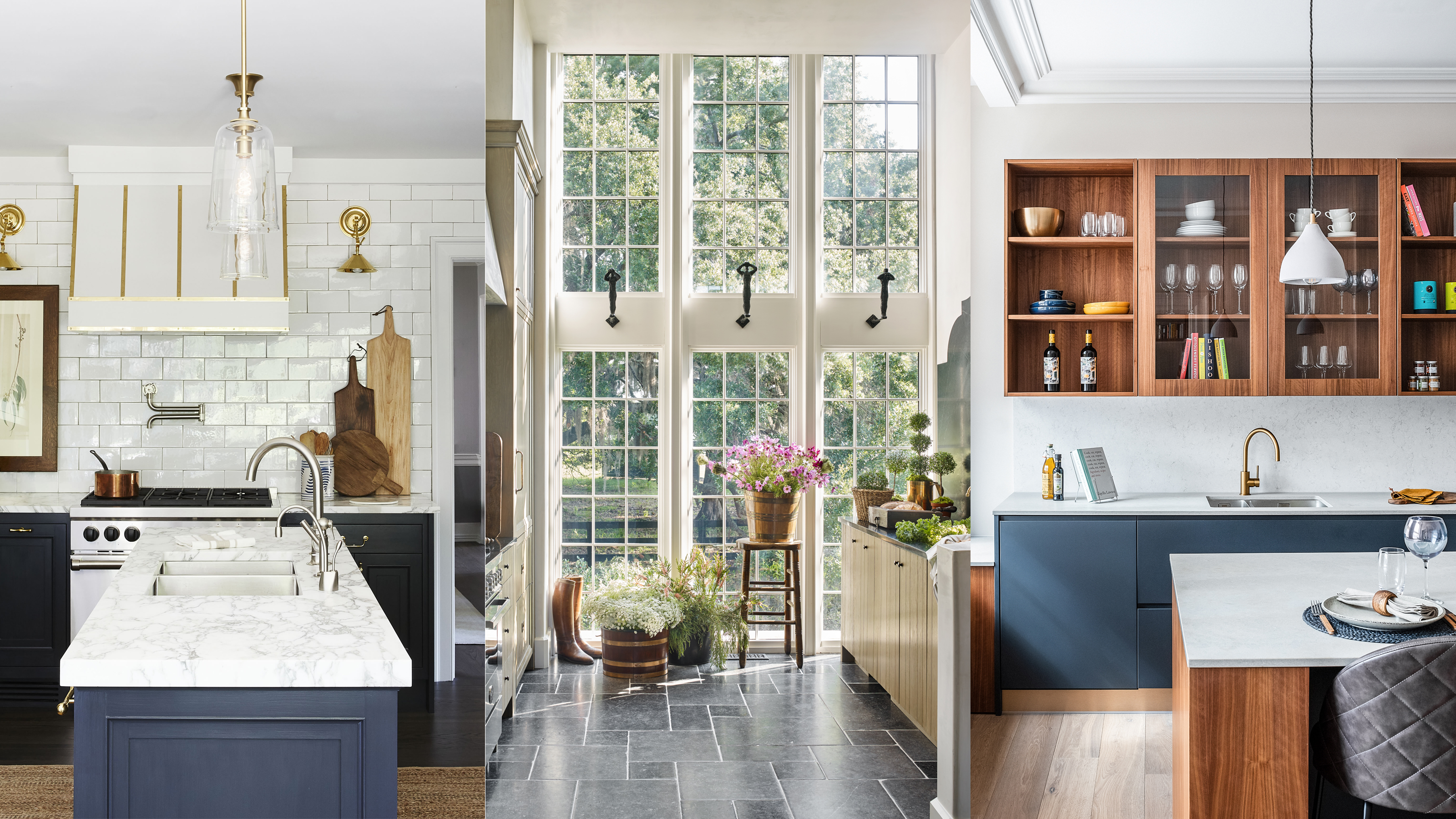
Design expertise in your inbox – from inspiring decorating ideas and beautiful celebrity homes to practical gardening advice and shopping round-ups.
You are now subscribed
Your newsletter sign-up was successful
Want to add more newsletters?

Twice a week
Homes&Gardens
The ultimate interior design resource from the world's leading experts - discover inspiring decorating ideas, color scheming know-how, garden inspiration and shopping expertise.

Once a week
In The Loop from Next In Design
Members of the Next in Design Circle will receive In the Loop, our weekly email filled with trade news, names to know and spotlight moments. Together we’re building a brighter design future.

Twice a week
Cucina
Whether you’re passionate about hosting exquisite dinners, experimenting with culinary trends, or perfecting your kitchen's design with timeless elegance and innovative functionality, this newsletter is here to inspire
The best small kitchen layouts are crucial to getting the most out of a room with less space than you’d like. Planning a small kitchen layout can be tricky, as finding the best layout can make or break a compact kitchen.
Our kitchen ideas guide to small kitchen layout ideas covers all the bases to help you reach the full potential of your kitchen.
While you might think options can be limited for small kitchen ideas, these smaller spaces often turn out to be far more ergonomically efficient.
No traipsing miles to gather ingredients, or circumnavigating a monolithic island unit to reach the sink. When space is tight, everything is meticulously placed for convenience and is exactly where you need it.
Best small kitchen layouts
When thinking about how to plan a small kitchen layout, it's best to make a list of your ‘must-haves’, particularly in terms of appliances, as they can swallow up a lot of storage space.
Take time to think about how you cook, who else needs access to the kitchen, even if it’s just the fridge, and where the dining table is in relation to the dishwasher.
Do seek advice from a professional kitchen designer. They are trained in spatial design and the latest space-saving innovations, and can often suggest ways to get more in to kitchen layouts without overcrowding.
Design expertise in your inbox – from inspiring decorating ideas and beautiful celebrity homes to practical gardening advice and shopping round-ups.
1. Maximize natural light to make a galley feel bigger
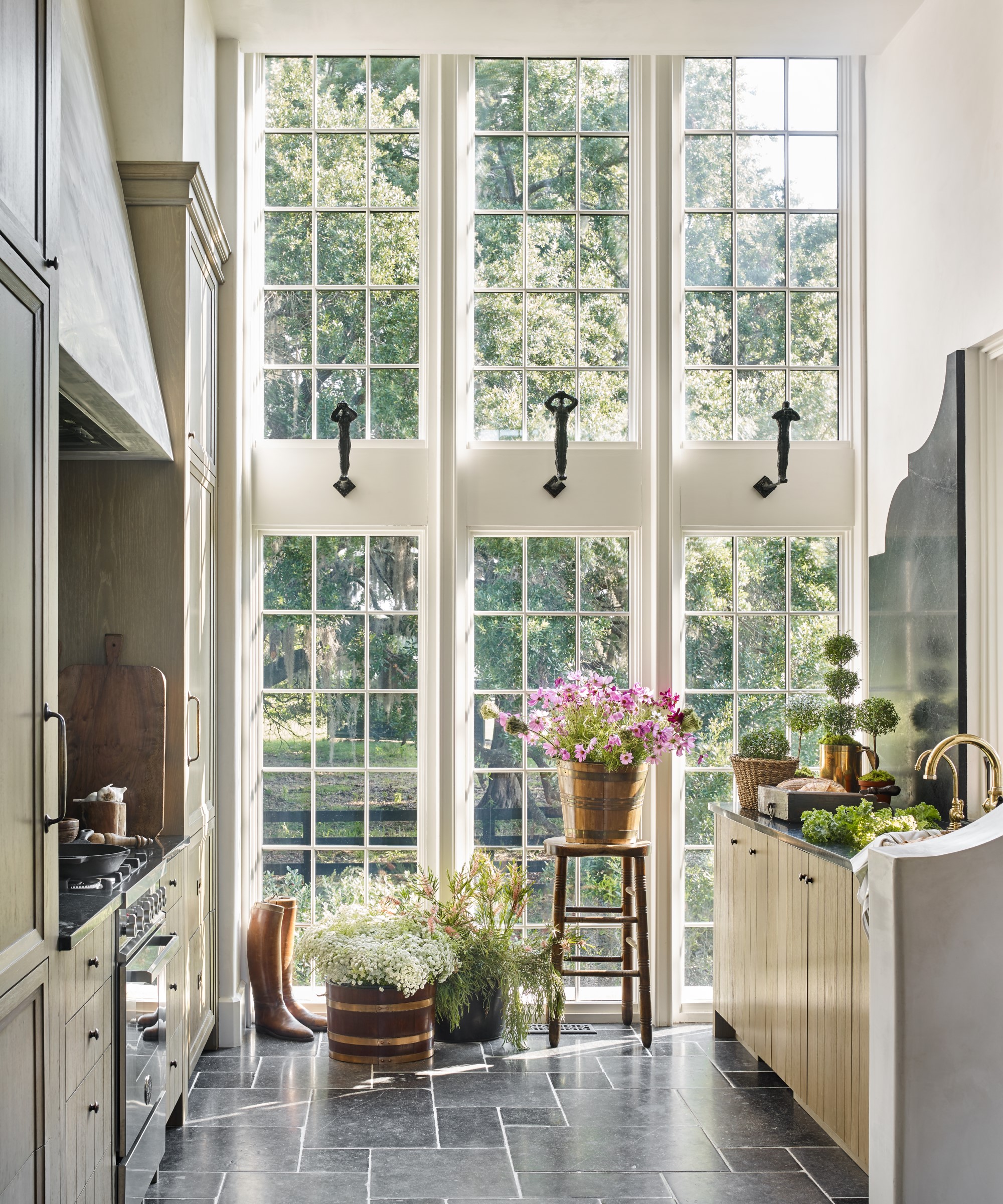
While it’s a highly sensible layout choice for a long, thin space, double galley kitchens have a reputation for feeling dark and pokey. To help make them feel bigger, be sure to maximize the room’s potential for natural light.
If it’s architecturally possible, maximizing window space at one end of the galley will do wonders for the sense of space in the room. In this small but breathtaking space by designer Beth Webb, the kitchen of a South Carolina hunting lodge is made to feel light and breezy through the use of floor-to-ceiling windows, helped by the positioning of another window on the perpendicular wall.
2. Open shelving and glass cabinets help create depth
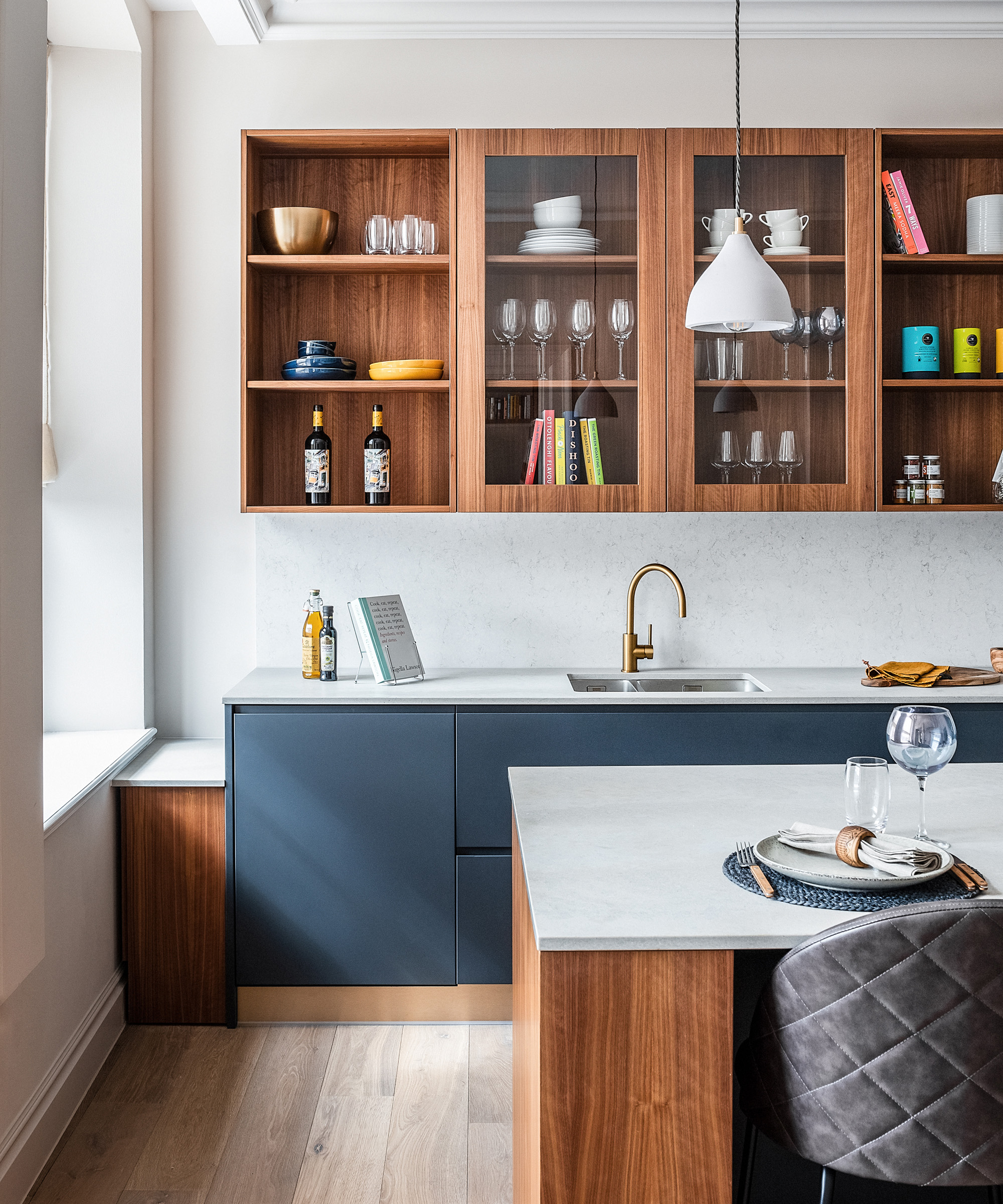
While closed cabinetry is perfect for keeping kitchens feeling neat and tidy, too much of it on the top half of the elevations is likely to make a small kitchen feel smaller – you’re effectively extending the solid wall outwards into the room.
To combat this, keep solid cabinetry to the lower half of the kitchen, and break up the higher levels with open kitchen shelving ideas and glass-fronted cupboards. In this apartment kitchen by London designers Ward & Co., open cabinetry is used exclusively above the worktops, allowing for a greater sense of depth in those areas.
3. Make the most of space with a double galley
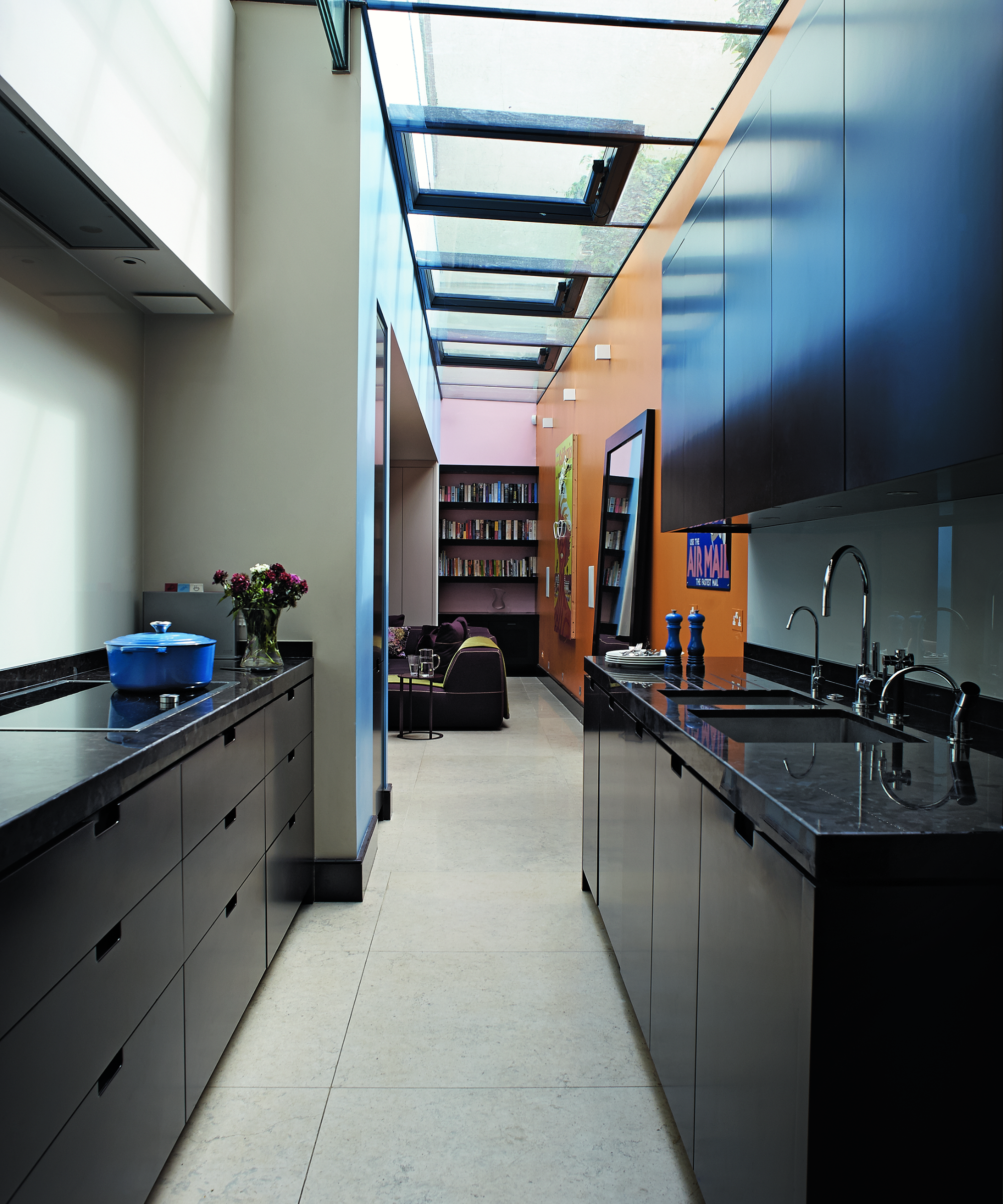
The only layout more spatially efficient than a single galley, is a double galley.
'Double galley kitchens are practical because they efficiently utilise both sides of a narrow space, offering more storage for small kitchens,’ explains Pluck’s co-founder George Glasier.
George also explains how this small kitchen layout can make a small kitchen look bigger: ‘As the cabinetry doesn’t meet at the room’s corners, they eliminate the awkward-to-reach corner cupboard debate. Visually they provide symmetry and therefore balance to the space, which can help make a small kitchen appear bigger.'
4. Try a moveable option
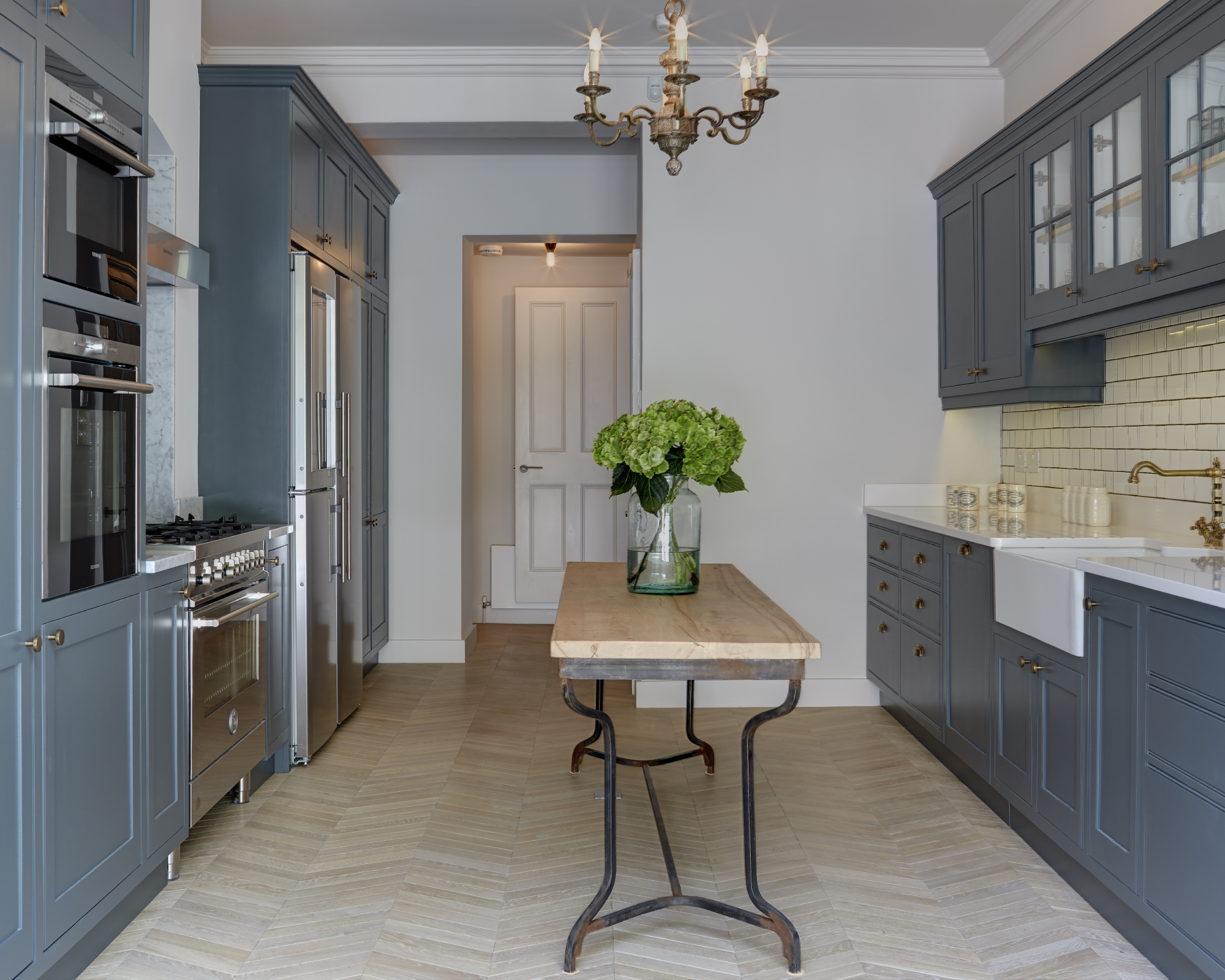
When space is tight, an island unit can become more of an obstacle than asset.
In this 3.6m wide kitchen, interior designer Robert Rhodes felt a permanent island, even a narrow one, would have made the space on either side feel small and compromised. Instead, a freestanding vintage table provides extra prep space when needed and can be moved out of the way when entertaining.
‘Going for a freestanding piece can prove much more flexible and also offers a more relaxed, laidback look than fitted units,’ says Robert.
5. Undulate worktops and cabinetry to make the most of space
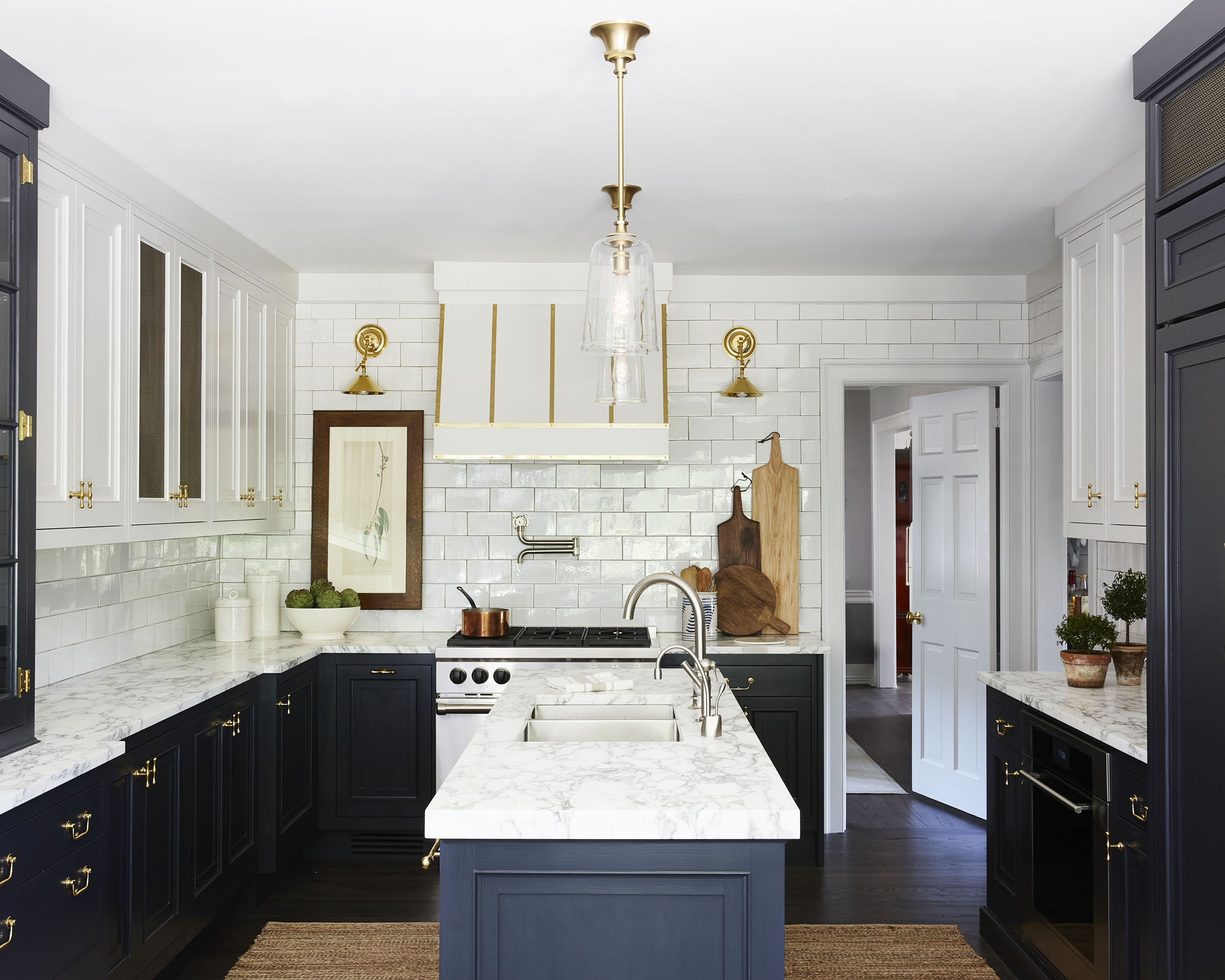
If you’re keen to eek out every bit of floor space you can, remember that worktops and cabinetry do not have to be at the same depth the whole way around the kitchen.
In this kitchen owned and designed by Waterworks Co-Founder Barbara Sallick, the worktop to the left hand side includes a small inlet opposite the island, between deeper areas that facilitate corner cupboards and a tall glass cabinet. This makes the most of walking space where those few inches of storage space aren’t necessary.
6. Get creative with awkward nooks
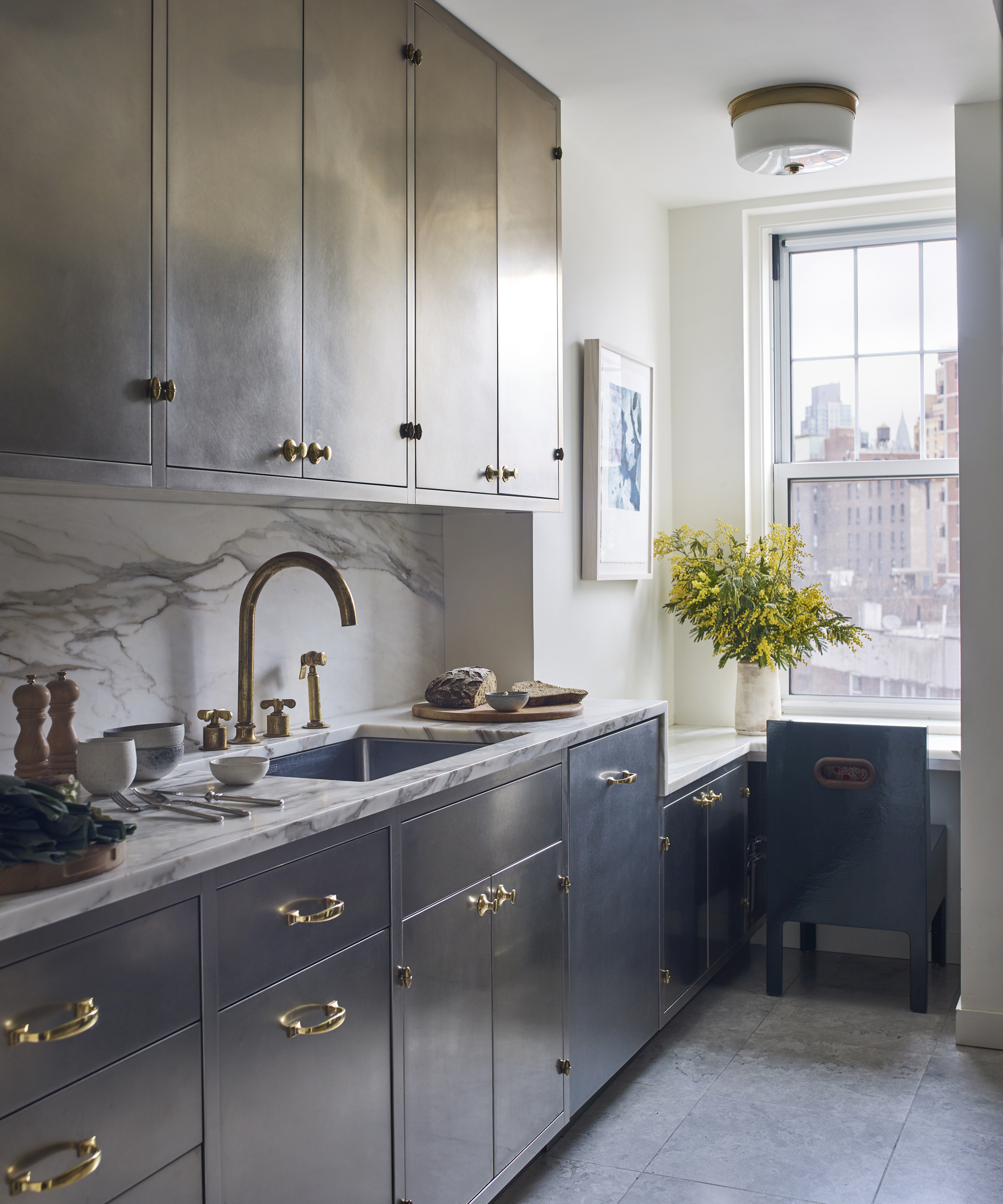
If you’ve inherited a kitchen where architectural features are an obstacle to making the most of the space, it’s time to get creative.
In this apartment kitchen owned by furniture expert Christine Retlev, a window with a low bottom edge makes it difficult to extend the worktop all the way to the end wall. Instead, Retlev installed a lower countertop, and turned the awkward nook into a seating area, perfect for enjoying a cup of coffee alongside views of Manhattan.
7. Add an island

Kitchen islands can have so many uses, whether it's for storage, extra worktop surface or for sitting.
By incorporating breakfast bar ideas into the design of your kitchen, you're making the space go further with the addition of a handy spot to eat and drink. And it takes up less room than a clunky kitchen table.
8. Think how a single galley might work
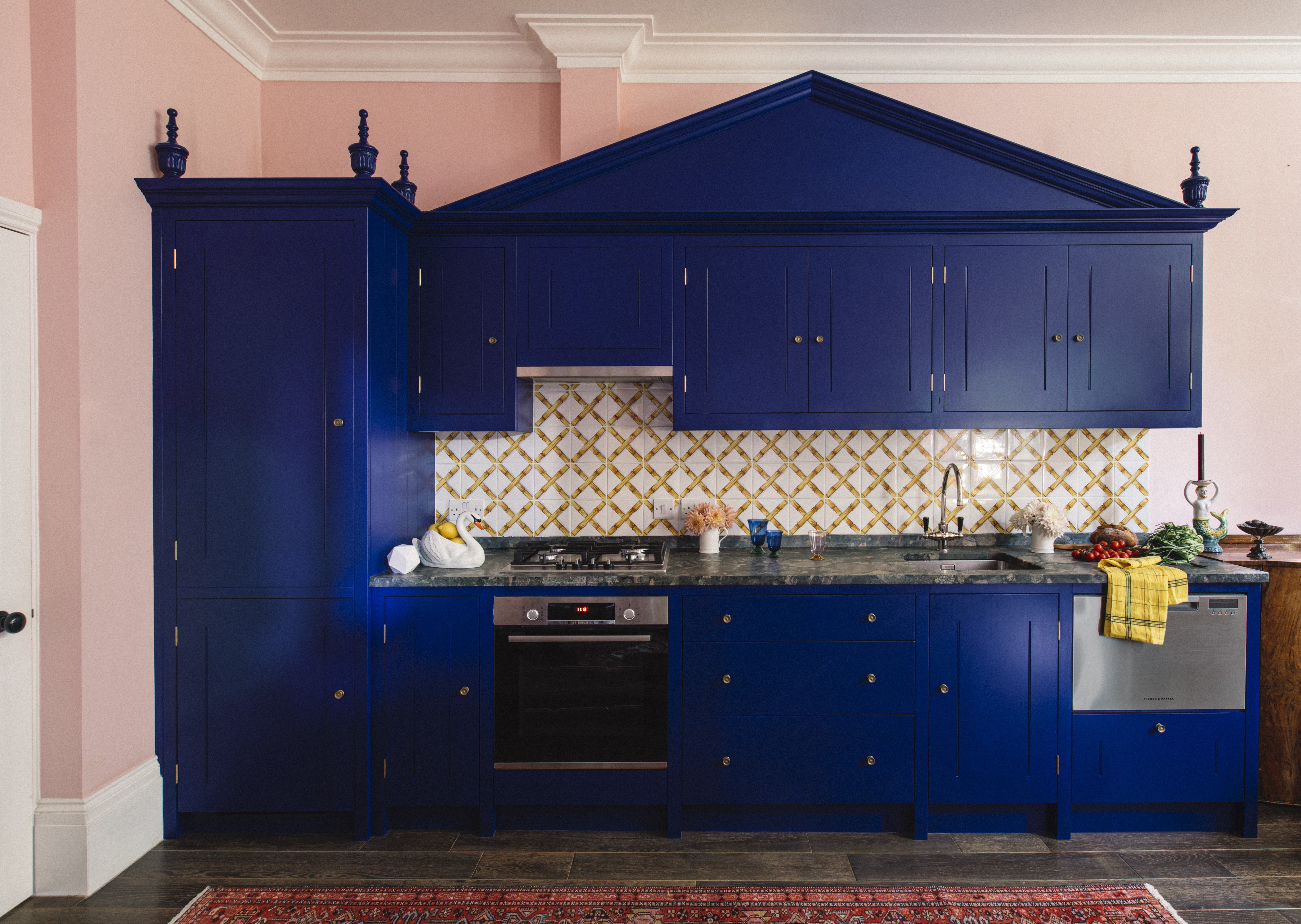
A single galley layout, with the entire kitchen on one elevation, is inspired by the confines of a ship’s galley, where every inch counts.
This striking cobalt kitchen belonging to artist and interior designer Luke Edward Hall is in an open-plan room that also accommodates dining and relaxing. Fortunately, the ceiling is high, so Luke could maximize his small kitchen storage options with wall cabinets, without overpowering the room.
‘You can see the kitchen from the sofa,’ says Luke. ‘Although I like to have fresh produce and ceramics on display, it is nice for us to be able to put things away.’
9. Consider U-shape solutions

If you have to cram a lot of units into a very small space, a U-shape layout is often the best bet. The downside of two corners is compensated by extra cupboard space on the end wall.
‘The key to compact U-shaped kitchens is using every inch to your advantage. Use Le Mans units inside corner cupboards. They’ll bring the contents out to you,’ says Hayley Robson, creative director, Day True.
‘Take the kitchen cabinets as close to the ceiling as possible. Not only does this look extremely elegant but it also maximises storage more than you would think.’
10. Choose to hide it away
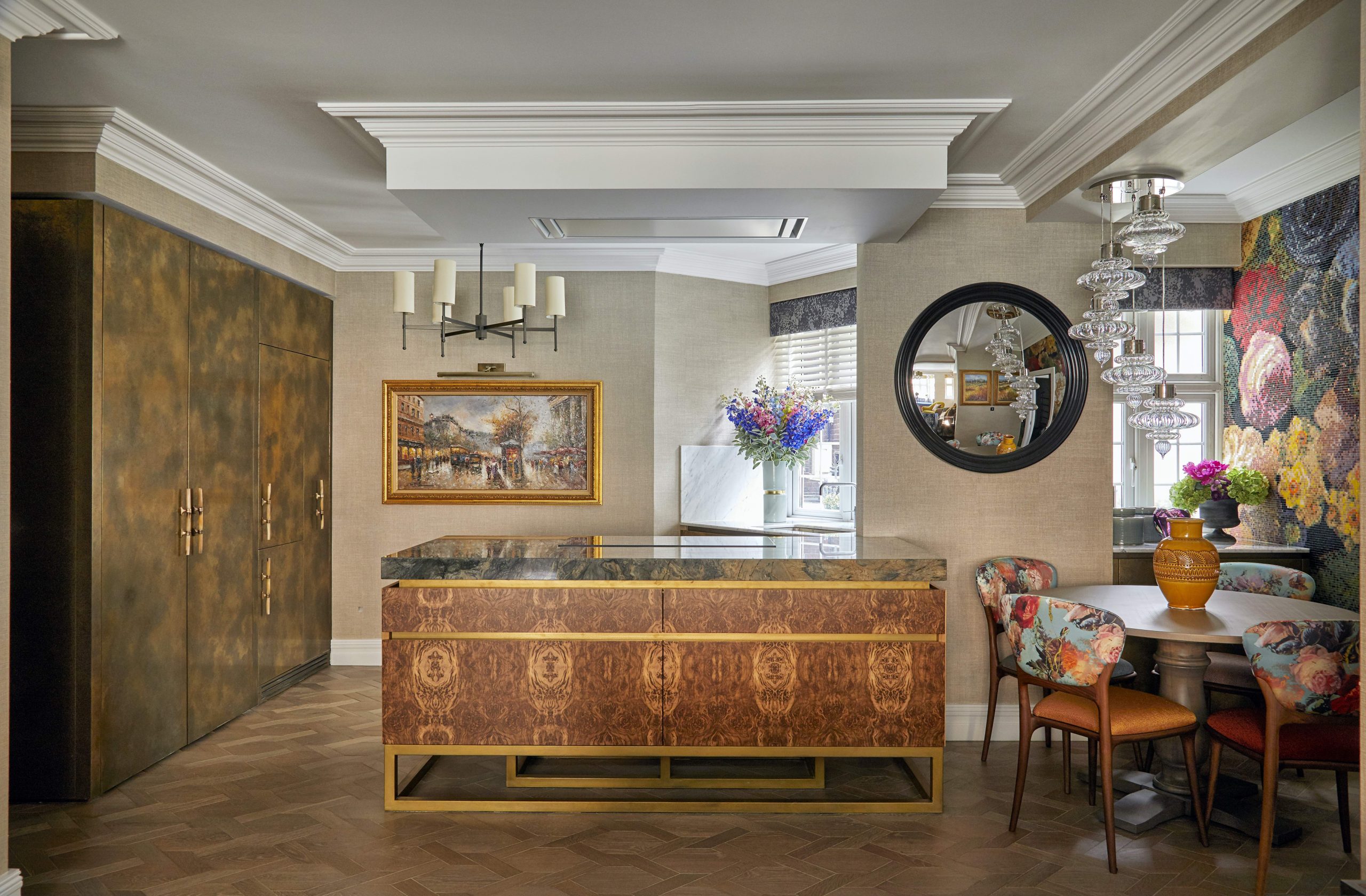
Combining kitchen, living and dining in one room is a common scenario in small apartments.
For this luxury space in Knightsbridge, interior designer Kia Stanford has conceived a hidden kitchen that conceals the more practical side of cooking when the owners are relaxing. ‘The trick is to select materials and finishes more typically associated with living room furniture,’ says Kia.
Here, tall pocket doors shut away the small appliances and boiling water tap. Don’t be fooled by first appearances, this hidden kitchen is fully equipped for cooking up a storm.
11. Add a narrow island
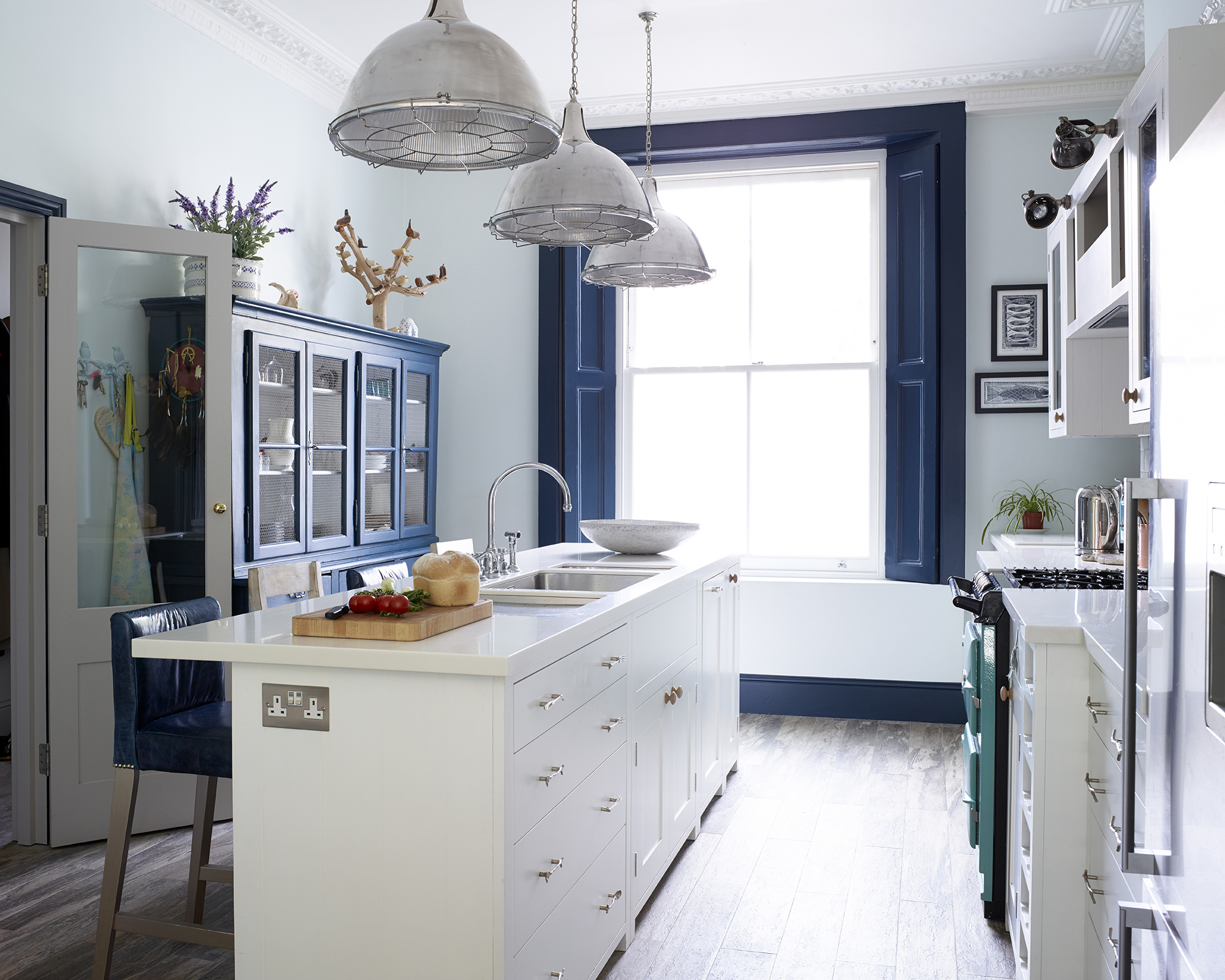
The width of floor space around an island is arguably more important than the width of the island itself. Aim for at least 90-100cm clear walkway around an island’s full perimeter.
‘It is essential not to make an island’s dimensions too big, as it may restrict movement around the kitchen,’ explains Ben Burbidge, managing director, Burbidge & Son.
An island unit should be at least one cabinet deep (60cm) to provide useful storage underneath, a little wider will be useful for spreading out when prepping on the surface.
12. Use clear walls
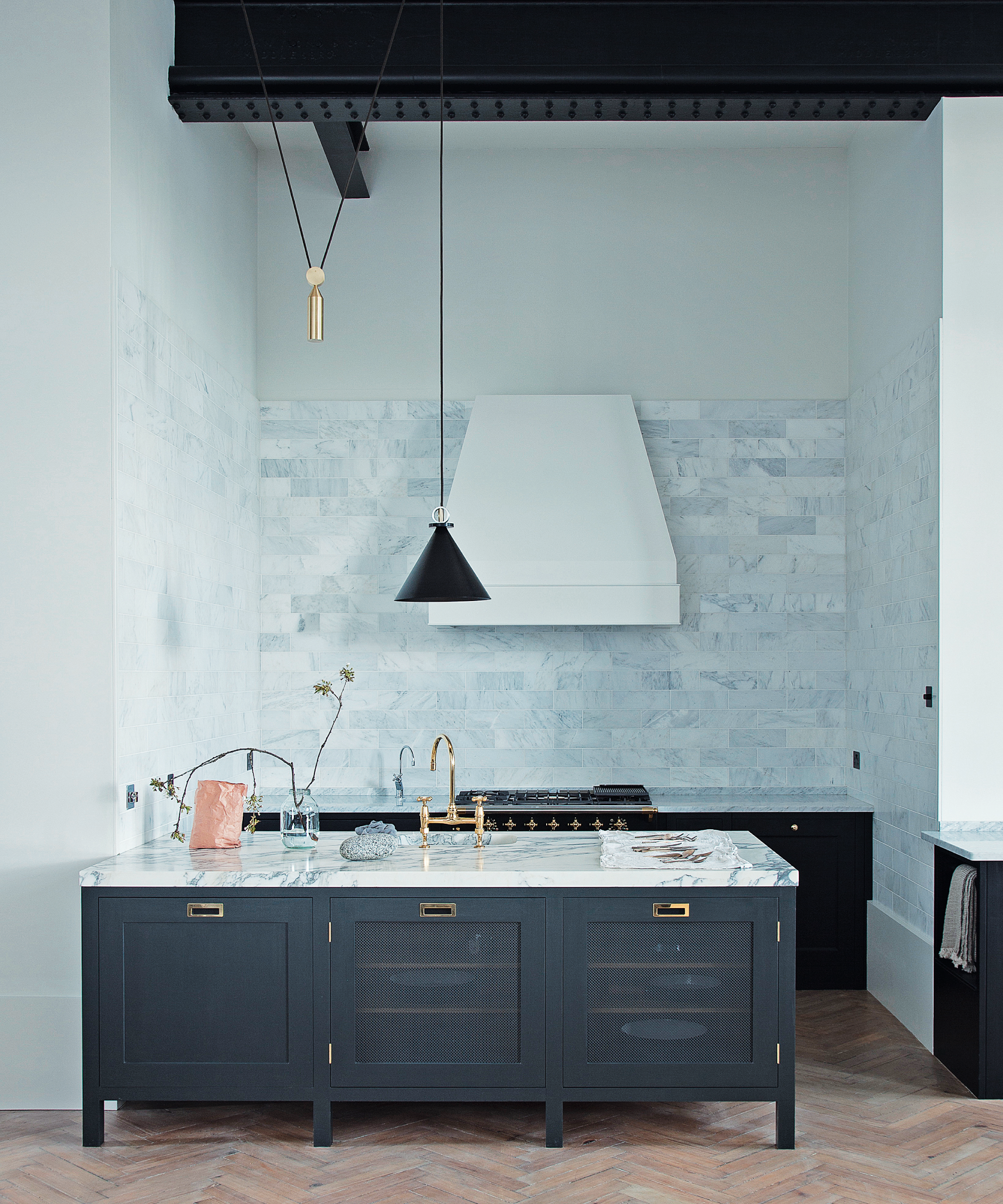
Leaving walls free from cabinetry can make a huge impact to the sense of space in a small kitchen. This only works if you have sufficient storage space elsewhere, such as a walk-in pantry.
Open shelving is less burdensome than solid wall cabinets, but even they create a degree of visual ‘noise’, so if it’s simplicity you are seeking, better to go without.
Here, Plain English has packed storage into both sides of the peninsula, leaving the walls blissfully empty, bar a simple cooker hood.
13. Try a breakfast bar
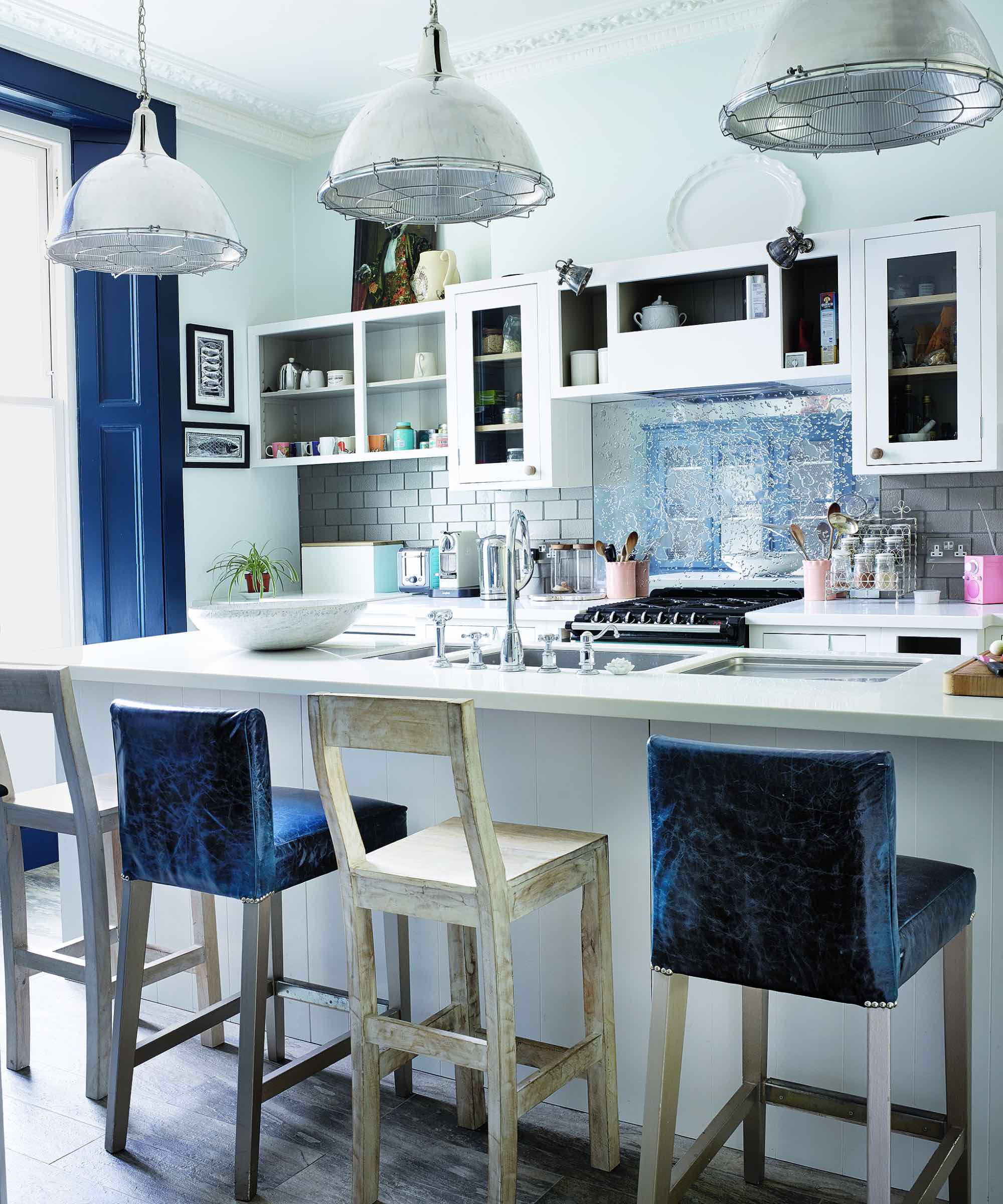
Perfect for casual meals, a quick coffee or chatting to friends while you cook – all without losing prep space – breakfast bars are hugely practical.
‘Don’t assume it isn’t possible to squeeze a breakfast bar into a small kitchen. What a table-style design lacks in storage, it more than makes up for in creating a feeling of lightness and space,’ says Fabiana Scavolini, CEO of Scavolini.
‘This style of breakfast bar is less obtrusive than a standard peninsula with base units and it opens up the space by showing more of the floor.’
Don't forget to think about lighting ideas for small kitchens, too, so your breakfast bar can stand out in all its glory.
14. Hide everything behind sliding doors
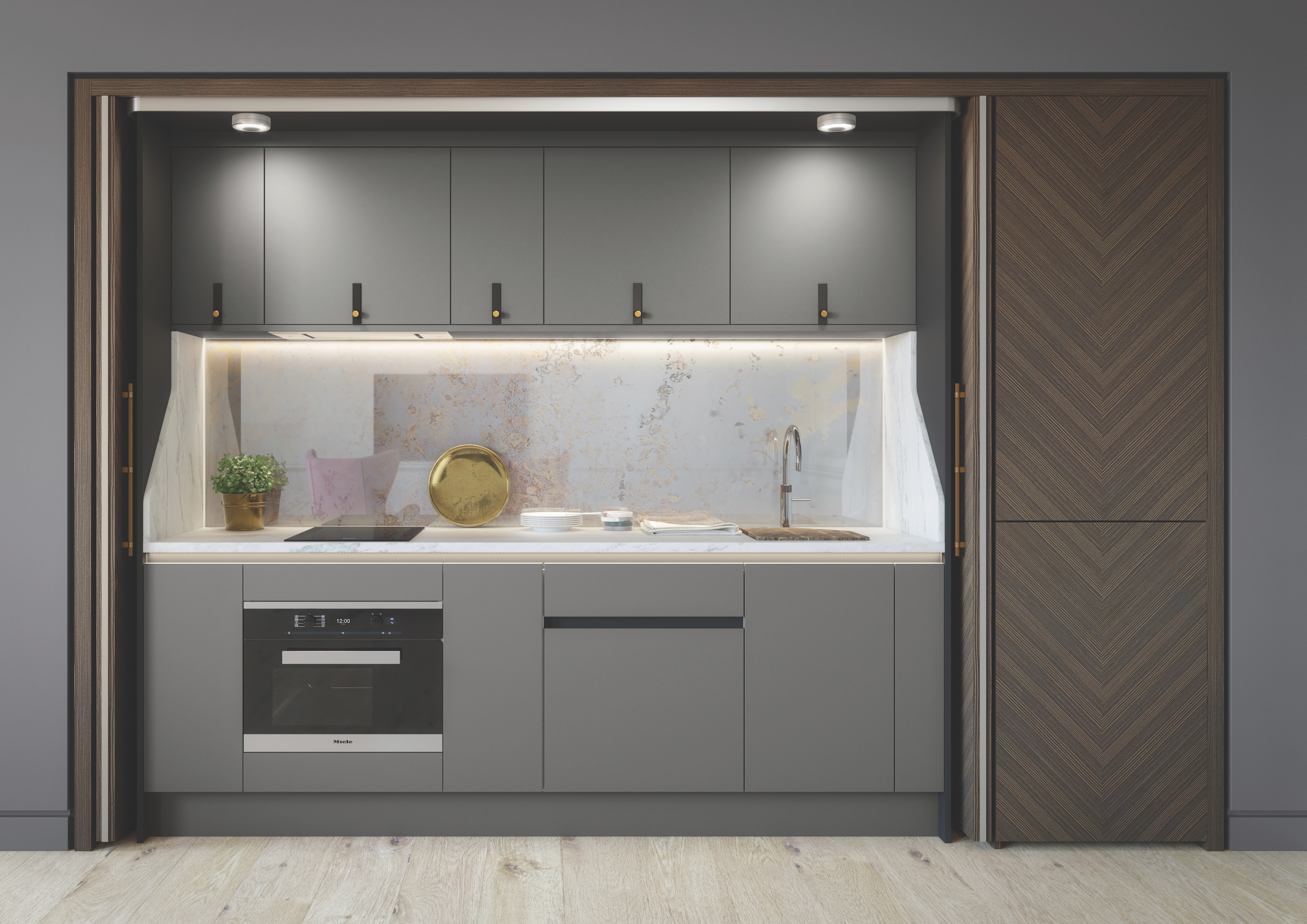
For small apartments, open-plan living and teeny-weeny floor plans, consider the option to conceal a one-wall, narrow kitchen from view with sliding doors. A single bank of floor-to-ceiling units (kitted out with storage, cooking, sink, the lot) can magically disappear when not in use thanks to fully retractable doors. The result is an uninterrupted wall finish, which, depending on your door choice, will add an extra dash of color and texture to a small space.
‘The most prevalent demand on modern properties is space,’ explains Graeme Smith, head of retail and commercial design at Life Kitchens. ‘Ever shrinking footprints mean that rooms are now multifunctional; combining living, dining and cooking into one space is fast becoming the norm. Life’s Hidden Kitchen provides everything needed with areas for preparation, cooking and storage. Essentials such as a fridge-freezer, oven and dishwasher are all included in this slim profile kitchen and with sliding, bifold doors, you can seamlessly hide it all away, leaving behind a statement, paneled wall feature.’
15. Add reflective surfaces
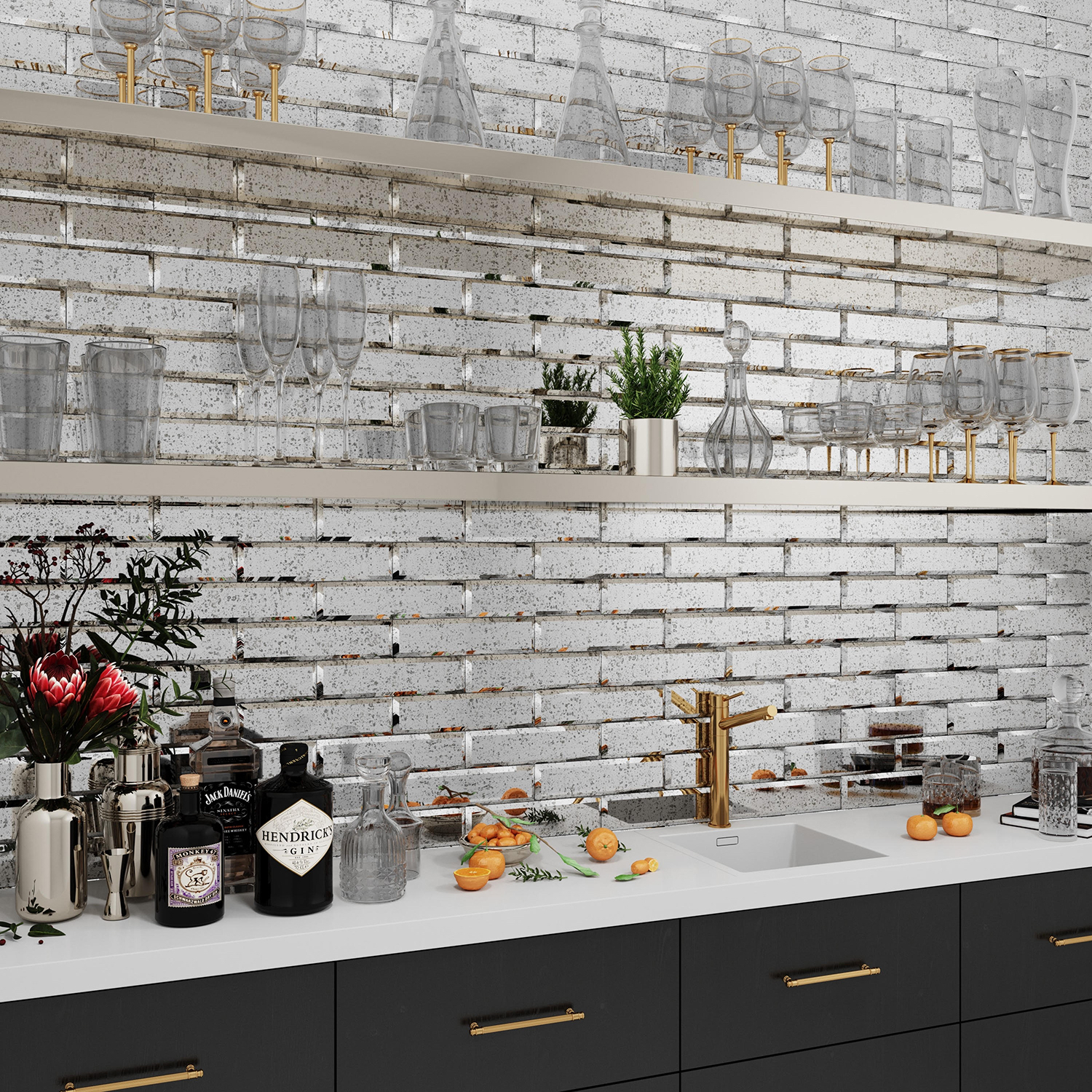
Glossy door fronts, transparent glass shelving and metallic appliances will all take advantage of natural daylight and help make a small kitchen layout feel roomier by bouncing any available light around the space.
‘One of my best tips for a small kitchen is to utilize mirrors within your space – they can make a small space seem much larger than it actually is,’ says Zara O’Hare, internal interior design consultant at Land of Rugs. ‘Any natural light flowing through the space can be bounced back through different areas, making it seem lighter and more airy. I would place mirrors opposite areas where natural light comes through into the space, so windows and doors are your main opportunity.’
These bevelled, antique mirror glass subway tiles will help open up a small kitchen layout.
16. Install hidden light sources
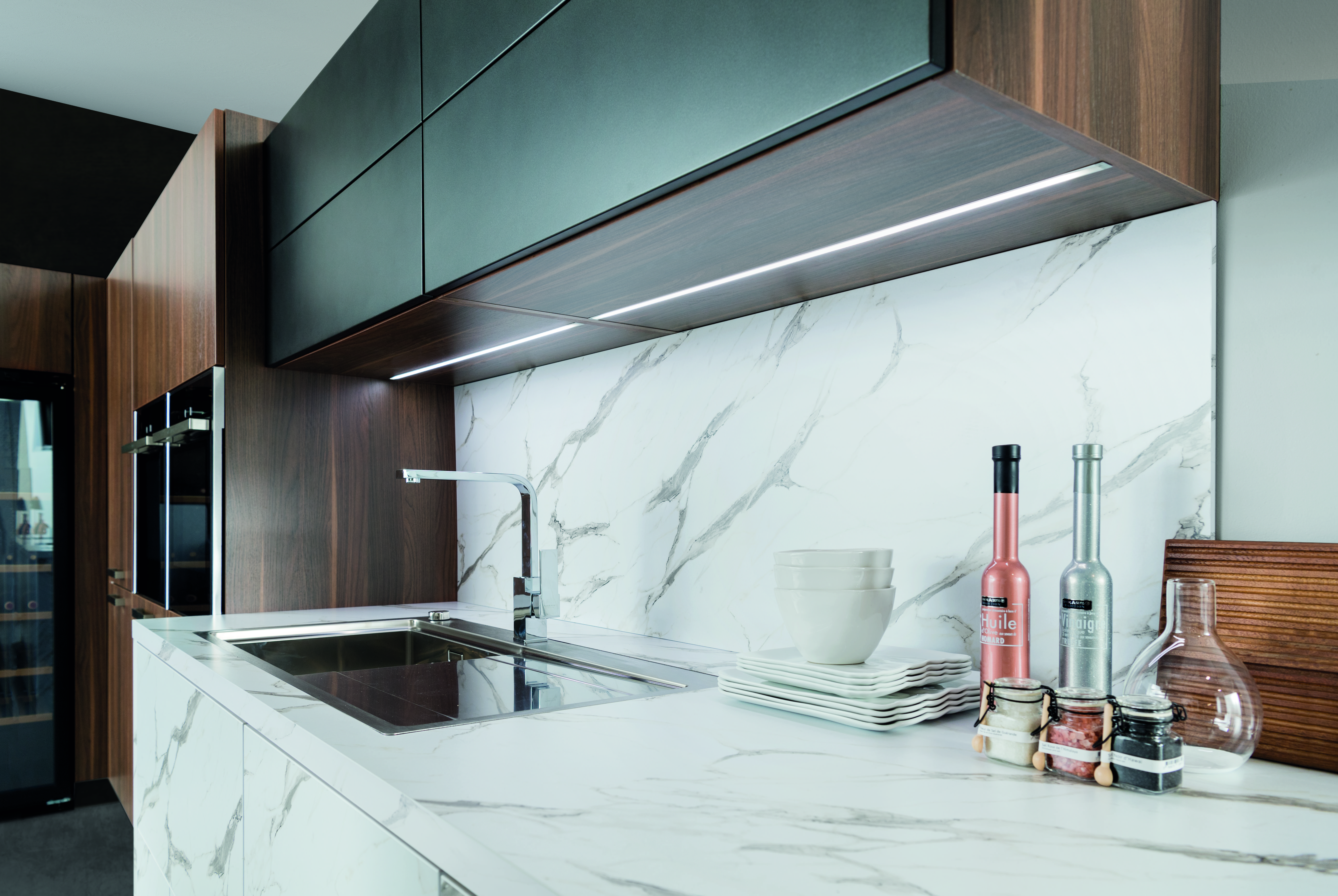
As well as mirror finishes and glossy surfaces, clever kitchen lighting ideas can be key to the success of small kitchen layout ideas. Slick, unobtrusive strip lighting hidden under a wall cabinet or embedded into a plinth will not intrude into valuable inches and create the illusion of more room in a compact kitchen. It will also help bounce natural daylight around your space.
‘Strategic placing of lights, reflective surfaces and a light color scheme will make your kitchen seem bigger than it is,’ says Giovanni Scippo, director at 3D Lines. ‘You should be using what we call task lights, which are placed above where you do most of the work – the sink and counter. Another small but effective trick is to line your shelves and cabinets with strip lights – they’re easily concealed and very functional.’
‘In a small kitchen, wall cabinets are usually necessary to give sufficient storage space, but unfortunately can make the room seem darker,’ adds Alice Pasteau, retail support manager, Schmidt UK. ‘Made-to-measure LED profiles can be built into your units, giving diffuse, neutral lighting over your countertop.’
17. Keep counters clutter-free in a small kitchen layout
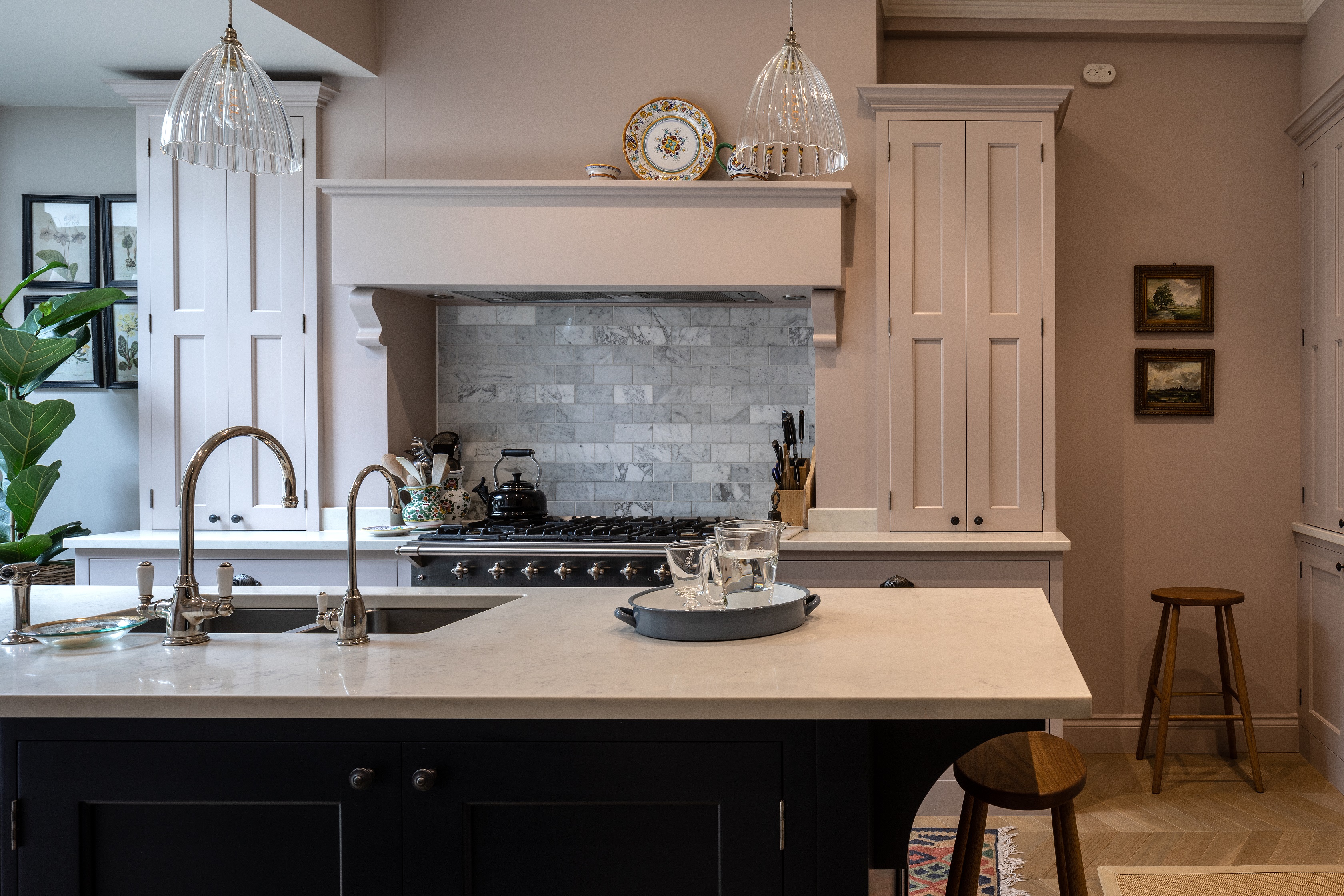
Clever small kitchen layout ideas should ensure countertop paraphernalia can be kept to a minimum. Small appliances, and sugar, tea and coffee canisters can all eat up valuable surface area for food preparation and make a kitchen feel messy and cramped. One way is to add extra shelving or wall cabinets for stashing away all of those items that are generally on show. Another popular idea is a dedicated breakfast cupboard, which sits on top of the counter, with space to hide away cereal, bread, coffee, preserves, bowls, mugs and small plates, plus kettles, toasters and juicers (with power points inside so they don’t have to be moved when used.
‘When designing a kitchen, it is important to understand how a client lives and uses the space,’ says Tim Higham owner of bespoke kitchen brand Higham Furniture. ‘At first, our recommendation for this fairly traditional kitchen in an Edwardian period property was to have wall cabinets either side of the chimney, freeing up the counter space next to the range.
‘However, when the client said that any empty worktop in their home would get cluttered, we agreed that the dressers would work best as they allowed for appliances and other items to be hidden out of sight.’
The proportions of the room led to a narrow small kitchen island, which is highly functional though, and includes a sink, dishwasher and bins plus sink and overhang for stools.
18. Create unexpected storage in a small layout
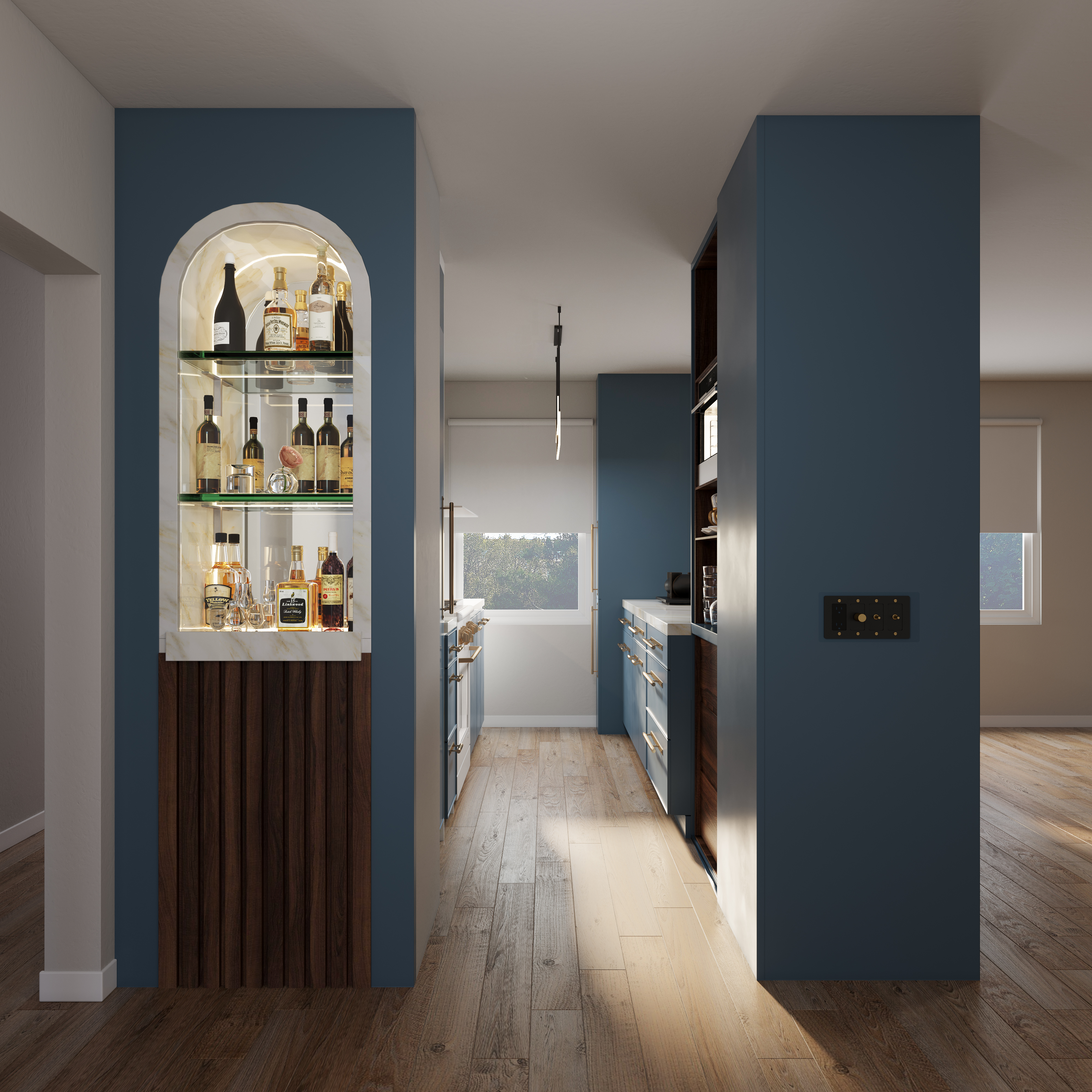
Think outside the box when it comes to layout in a limited footprint. Small kitchen layouts should include great storage solutions plus implement top tactics for organizing a small kitchen. Try built-in benches, unused plinths that can be transformed into slim, toe-kick drawers and skinny larder cabinets with adjustable racking systems that utilize a narrow, redundant gap.
Using a modern mix of petroleum blue, walnut and brass, this small kitchen started life enclosed on all sides by walls, separating it from the rest of the house. Now, it is open plan to the living room, with a kitchen island that features a removable dining table and clever storage columns with a chic bar area.
‘By opening up the kitchen, I was able to capture unused space in the hallway and create additional storage through the insertion of the kitchen island,’ explains interior designer Ahmad AbouZanat of Project AZ. ‘The bar area is an entirely new area of storage they didn’t have before.’
19. Use flooring to alter proportions
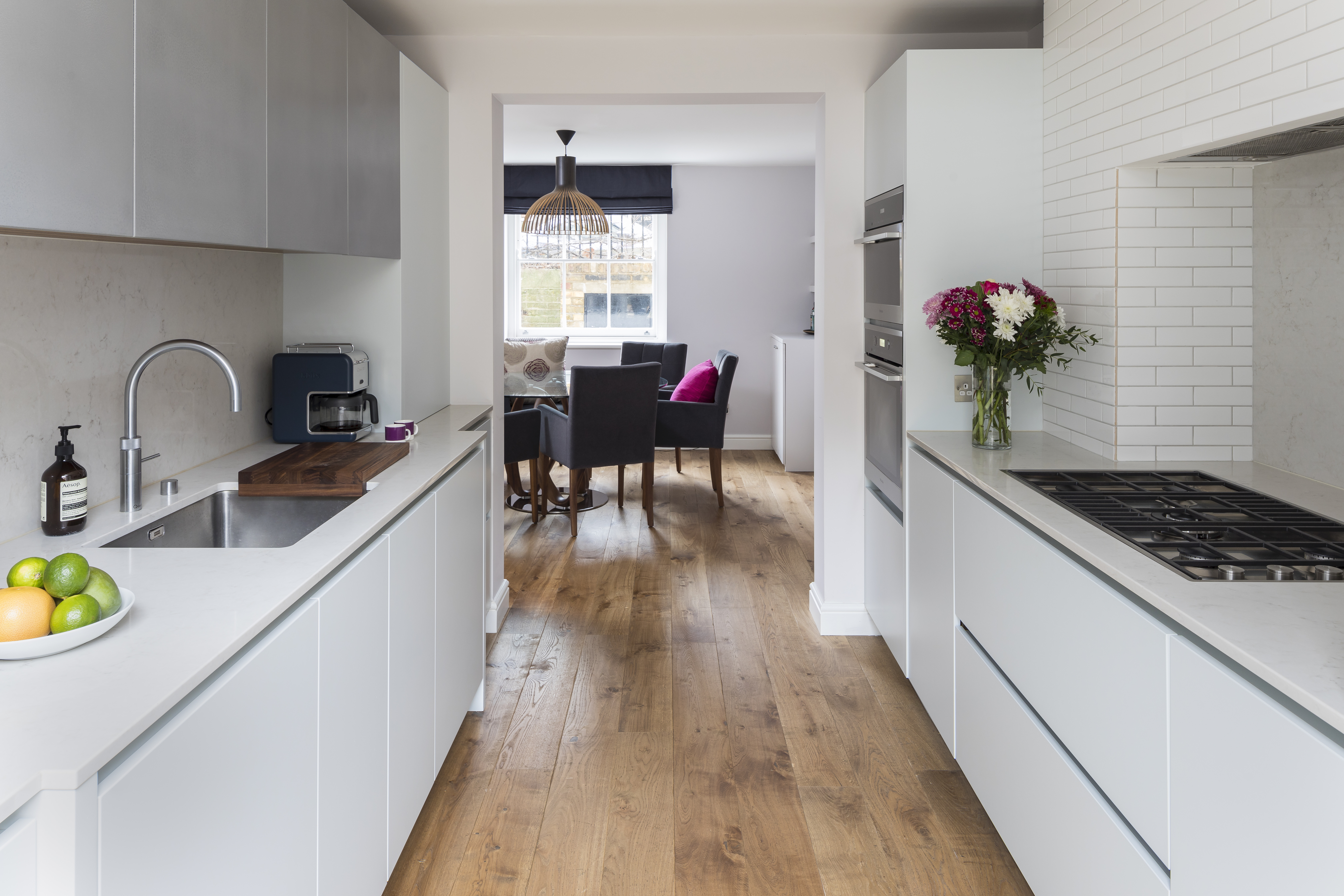
Create the illusion of more space with your choice of kitchen flooring. Hardwood floor planks can draw the eye down the room to make it seem longer or across it so it feels wider depending on which way they are laid. This clever design trick is particularly useful when a small kitchen leads into a living area; laying the same floor throughout will create a seamless, unbroken mood and add a sense of depth.
‘With space coming at a premium for some rooms, interiors are required to work harder and in turn become more flexible,‘ says Greg Elliot, head of technical at Havwoods. ‘The floor then becomes one of the largest fixtures and so designers are putting extra focus on how it impacts the space. Vertically placed planks or wide, long planks work particularly well in galley kitchens as they will increase the sense of space in the room.’
20. Be clever with color
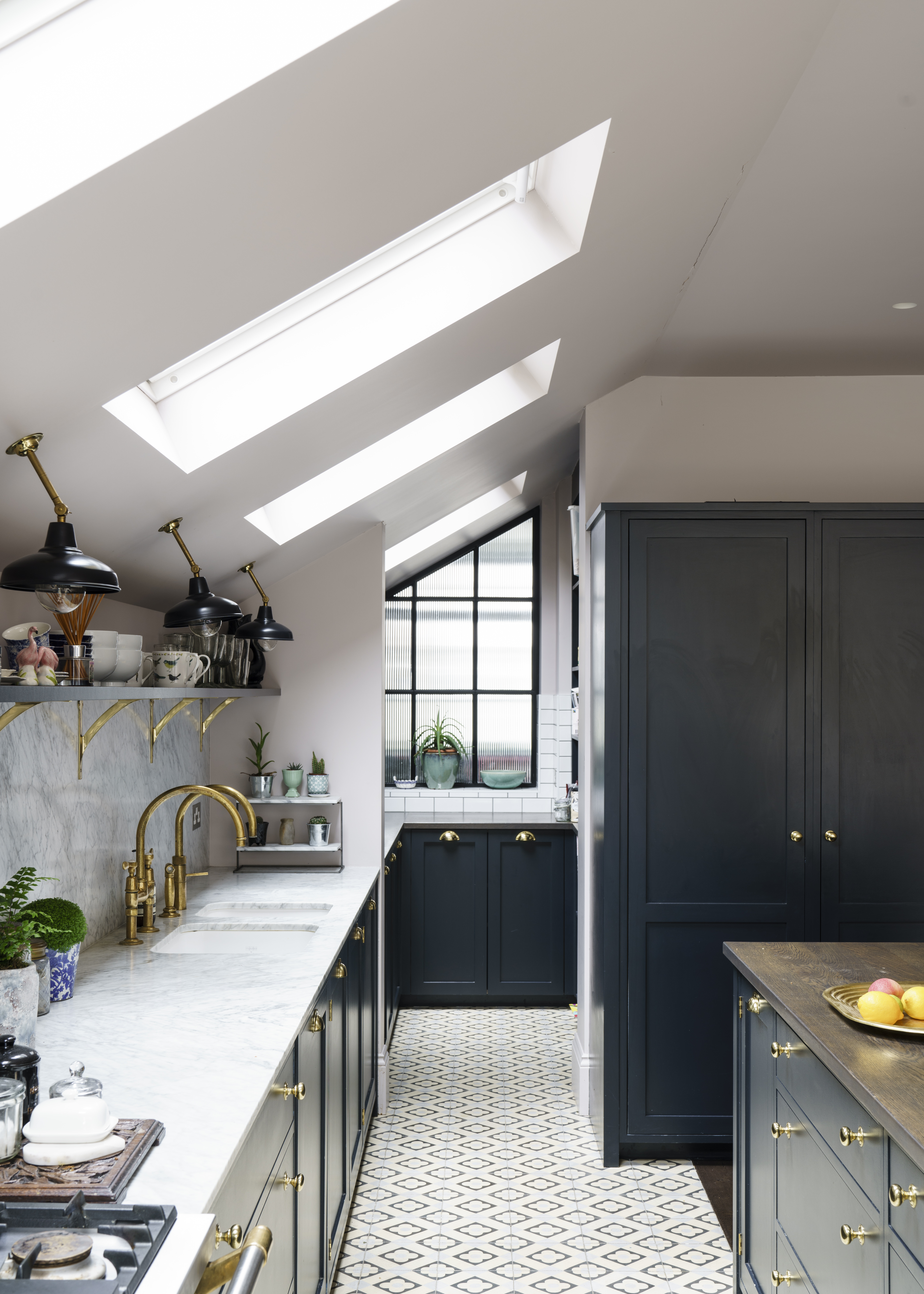
Sticking to a pale small kitchen paint colors is a foolproof way to make the most of the light in a small kitchen. Of course, if you want drama and bold color, an all-over paint shade can instead be applied to striking effect. Try painting cabinets, walls and ceiling in the same top-to-toe color to blur the lines of a small kitchen layout and create the illusion of a bigger area.
If that’s a step too far for your design tastebuds, introduce contrasting colors in a simple way: use darker colors such as navy or forest green on the floor cabinets and paint wall cabinets and walls in a pale shade to blend in with the ceiling.
What is the best layout for a small kitchen?
The best kitchen layouts are usually dictated by the immovable architectural elements, like windows, doors, chimney breasts and structural beams.
Try to avoid layouts that involve corners, such as L and U-shapes, but if a corner is inevitable, do make use of internal storage mechanisms like Le Mans and carousel systems.
Drawers are considered superior to cupboards in terms of full access to all contents. Also think about how cabinets and appliances open. A dishwasher door that clashes with a fridge door opposite will endlessly annoy.
How do you declutter a small kitchen?
One way to declutter a small kitchen is through the use of cabinetry. A plain slab door with push-touch or recessed handles will look sleeker than a framed door with protruding hardware.
Likewise, a breakfast cupboard with bi-folding or tambour doors can be used to hide away countertop appliances, including the coffee machine and toaster. A boiling water tap takes the kettle out of the equation and can be combined with your regular hot and cold supply in one neat unit.
Larders always sound like a luxury exclusive to large kitchens, but they utilise the room’s height, so offer impressive volumes of storage. Hang a small set of steps on the inside of the larder door for easy access to the top shelves.
What appliances are best for small kitchens?
Multifunctional appliances are best for small kitchens, like a combi-microwave or combi-steam oven, which are essentially two cooking methods in one.
You can also get single ovens that can be split to cook at different temperatures; like a double oven but in a smaller footprint. Built-in, compact appliances are 45cm-high, instead of 60cm, and can be stacked neatly. Induction hobs with built-in extraction can also save space overhead but do check how much cupboard space you’ll lose below for the motor unit.
Slimline dishwashers are 45cm-wide, which can make all the difference if you’re counting every cm. Under-mounted drawer-style refrigeration comes with impressive capacities.
Do think very carefully about the appliances you need, or you could end up with nowhere to store crockery. Could a wine fridge fit in the dining room for example?
Linda graduated from university with a First in Journalism, Film and Broadcasting. Her career began on a trade title for the kitchen and bathroom industry, and she has worked for Homes & Gardens, and sister-brands Livingetc, Country Homes & Interiors and Ideal Home, since 2006, covering interiors topics, though kitchens and bathrooms are her specialism.
- Lara SargentContributing Editor
